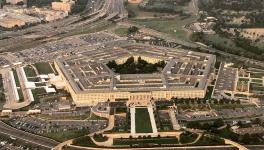Joe Biden Speaks on India – the Good, Bad and Ugly
US presidential candidate Joe Biden & running mate Kamala Harris. (File photo)
The Democratic Candidate Joe Biden’s remarks Wednesday on the US-Indian relationship have elements of the good, bad and the ugly. Biden, a consummate politician, poses an intellectual challenge to foreign observers. The momentous US election on 3rd November brings out his vast experience into every breath he takes, every word speaks.
This election is going down to the wire. And the great presidential debates are yet to begin — four days still to go. The fact that Biden chose the podium of a ‘virtual’ fundraiser for Indian Americans to express his views comes as no surprise, as the Indian Diaspora in America, who ignored the Sangh Parivar activists’ chorus of support for Trump, is playing a historical role by smoothening the wrinkles that Howdy Modi and Nameste Trump needlessly created.
There are nuances in Biden’s remarks that should not go unnoticed, since a Biden presidency is regarded as no longer a mere probability. To start with the ‘ugly’ part first, Biden has reportedly said that he believes the US-Indian relationship is “not about photo ops or handshakes, it is about getting things done.”
This is a repudiation of ‘hug diplomacy’ and bromance and their excessive manifestations in the past 3-4 years — Howdy Modi, Namaste Trump. Again, it disapproves of high octane diplomacy for its own sake — sound and fury signifying nothing.
Isn’t it stunning that Biden could discuss US-Indian relationship without making a single reference to Modi? Biden does not belong to the Modi school of international diplomacy with heavy accent on showmanship and grandstanding.
Indeed, Biden has a reputation for being a conciliatory extravert, who often compliments, praises, or flatters others, presenting an image of goodwill, and even when disagreements occur, he temperamentally attempts to smooth things over, sometimes even at the cost of conceding.
Biden is more like Bill Clinton than the cool and cerebral Barack Obama — a very emotional, very animated and voluble human being and a back-slapping politician. Modi erred seriously by allowing himself to be guided by the Sangh Parivar activists in the US to assume that Trump’s re-election is a foregone conclusion. Trump may well win, but he may also lose. That is the enigma of elections and Modi should have known it.
To my mind, this is the third time the BJP’s imprudent foray into India’s foreign policy arena produces a blowback — the other two being India’s relations with Pakistan and Sri Lanka.
India is not a single party state and national interests ought to navigate the country’s foreign policy and diplomacy. Hopefully, such senseless folly will not repeat in regard of India’s One-China policy, the present-day maverick opinions notwithstanding.
Biden is no liberal and has shown willingness to reinvent himself as a neo-socialist to fulfil what he believes is his presidential destiny. That is why Alexandria Ocasio-Cortez was able to write her Green New Deal into the Democratic platform; why Biden vowed he would be in charge of rounding up America’s guns and he wants to have an end to racism, free Medicare and free college; and, why Bernie Sanders confidently promised that Biden would be “the most progressive president since FDR.”
In fact, Democrats everywhere are running on this platform in the 2020 Congressional elections. And they won’t abandon it once elected. Four years of Trump leave them with simply no choice in the matter. It’s an existential choice for Democrats. And Biden has shape-shifted to fit the Democratic Party’s new progressive mould.
That s to say, a ‘value-based’ US-Indian agenda between the Modi government and the Biden presidency is unlikely. Biden can’t be liking the human rights violations taking place in India today, the right-wing populist majoritarian politics on the ascendancy in our country, or the steady emasculation of democratic values and pluralism that we are witnessing. This cannot be Biden’s idea of India.
Modi government could not even bring itself to show the moral courage to utter a word of appreciation when the oldest political party in America — and the oldest extant voter-based political party in the world — bestowed on an Indian-American such a high honour as choosing her as its vice-presidential candidate. Instead, Modi and Trump are in mutual adulation in their management of the Covid-19 epidemic!
In the final analysis, nonetheless, the good part is that Biden places importance on the US-Indian relationship. The overall drift of his remarks is very positive. Biden remains a staunch believer in the raison d’être of the US-Indian relationship.
Conceivably, External Affairs Minister S. Jaishankar will be an indispensable colleague for Modi in a Biden presidency. It is inconceivable that Jaishankar forgot to cultivate Biden during his ambassadorship in Washington. And it cannot be lost on Jaishankar that Biden’s decency defines him — his empathy, warmth, devotion to the dignity of every human being, kindness to staff and closeness to family through a welter of personal tragedies.
Biden believes in winning over political adversaries, not running them over. So, in a Biden presidency India will get a second chance. Having said that, India also has to adapt to a paradigm shift. A prospective President Biden’s foreign policy orientation would most likely be that of a conciliatory leader.
Biden will be akin to Presidents Harry Truman and Dwight Eisenhower — not inclined to reshape the world in accordance with a grand vision and more likely to be tending to respond to circumstances with the sympathetic hope that accommodations can be negotiated.
He is a flexible, hopeful politician, open to change but may lack the consistency and will to consummate his policy objectives. Suffice to say, his conception of the ‘Indo-Pacific order’ is highly unlikely to be Mike Pompeo’s.
Therefore, Jaishankar should travel light for his last waltz with US Pompeo in Tokyo during the Quad meeting next month on China’s doorstep. (The most judicious course would have been to skip this untimely journey altogether.) The ‘rules-based Indo-Pacific order’ will come with caveats in a Biden presidency. For, the inference can only be that the general tenor of a prospective Biden presidency will be conciliatory.
In the words of former president George W. Bush, Biden is a quintessential “uniter, not a divider.” The corollary will be that Biden is overly open to influence, which cannot but impact his leadership effectiveness in negotiations with foreign adversaries.
Courtesy: Indian punchline
Get the latest reports & analysis with people's perspective on Protests, movements & deep analytical videos, discussions of the current affairs in your Telegram app. Subscribe to NewsClick's Telegram channel & get Real-Time updates on stories, as they get published on our website.
























